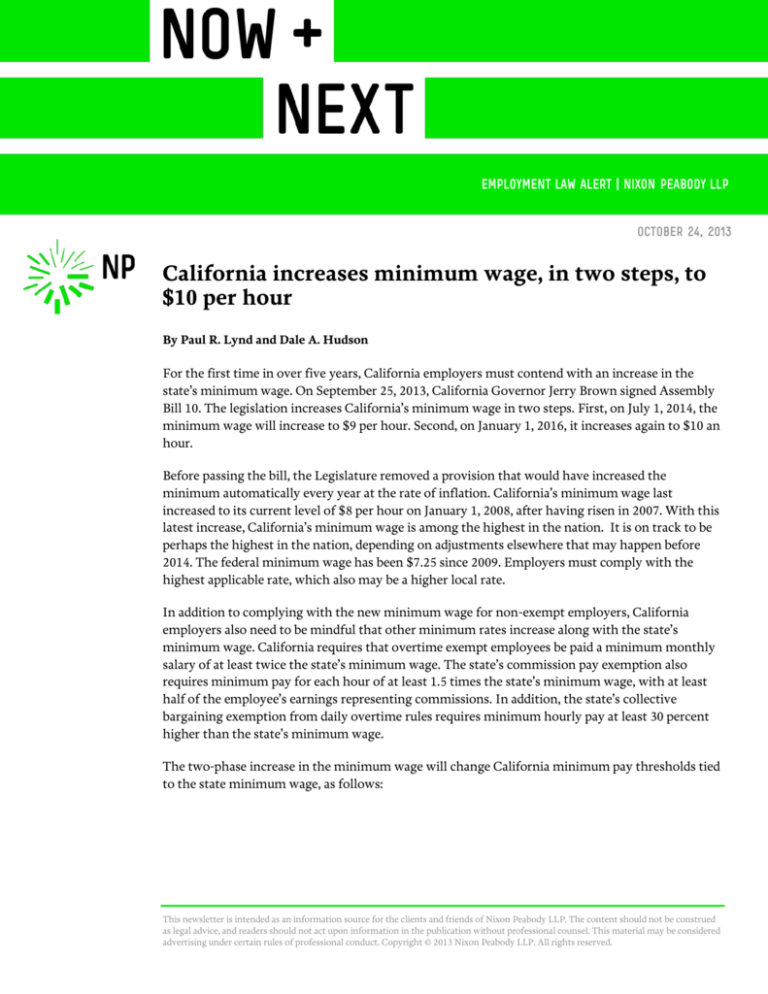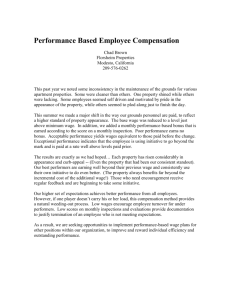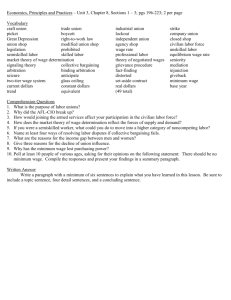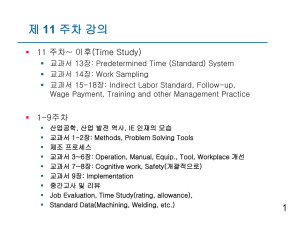
October 24, 2013
California increases minimum wage, in two steps, to
$10 per hour
By Paul R. Lynd and Dale A. Hudson
For the first time in over five years, California employers must contend with an increase in the
state’s minimum wage. On September 25, 2013, California Governor Jerry Brown signed Assembly
Bill 10. The legislation increases California’s minimum wage in two steps. First, on July 1, 2014, the
minimum wage will increase to $9 per hour. Second, on January 1, 2016, it increases again to $10 an
hour.
Before passing the bill, the Legislature removed a provision that would have increased the
minimum automatically every year at the rate of inflation. California’s minimum wage last
increased to its current level of $8 per hour on January 1, 2008, after having risen in 2007. With this
latest increase, California’s minimum wage is among the highest in the nation. It is on track to be
perhaps the highest in the nation, depending on adjustments elsewhere that may happen before
2014. The federal minimum wage has been $7.25 since 2009. Employers must comply with the
highest applicable rate, which also may be a higher local rate.
In addition to complying with the new minimum wage for non-exempt employers, California
employers also need to be mindful that other minimum rates increase along with the state’s
minimum wage. California requires that overtime exempt employees be paid a minimum monthly
salary of at least twice the state’s minimum wage. The state’s commission pay exemption also
requires minimum pay for each hour of at least 1.5 times the state’s minimum wage, with at least
half of the employee’s earnings representing commissions. In addition, the state’s collective
bargaining exemption from daily overtime rules requires minimum hourly pay at least 30 percent
higher than the state’s minimum wage.
The two-phase increase in the minimum wage will change California minimum pay thresholds tied
to the state minimum wage, as follows:
This newsletter is intended as an information source for the clients and friends of Nixon Peabody LLP. The content should not be construed
as legal advice, and readers should not act upon information in the publication without professional counsel. This material may be considered
advertising under certain rules of professional conduct. Copyright © 2013 Nixon Peabody LLP. All rights reserved.
Minimum wage
Effective date
Minimum monthly salary for exempt
executive, administrative and
professional employees
Collective bargaining exemption
Split shift premium (if applicable)
$8.00
1/1/2008
$2,773.33
($33,280
per year)
$10.40/hour
$8.00
$9.00
7/1/2014
$3,120.00
($37,440 per
year)
$11.70/hour
$9.00
$10.00
1/1/2016
$3,466.67
($41,600 per
year)
$13.00/hour
$10.00
The minimum wage increase will not affect the pay thresholds for the computer software
professional exemption or the physician employee exemption. The state’s Department of Industrial
Relations adjusts these minimums annually based on the rate of inflation.
The higher pay thresholds will apply to all employees who are based in California. In addition,
pursuant to the California Supreme Court’s decision in Sullivan v. Oracle, these thresholds may
apply to out-of-state residents working temporarily in California.
What employers should do
Companies with employees in California will need to prepare to adjust compensation levels to
comply with these new thresholds. The greatest impact will certainly be on minimum wage
workers, who will be directly impacted by the new pay rates. In addition, employees currently just
above the minimum wage may also receive pay adjustments, as employers attempt to maintain the
appropriate relative pay levels with respect to employees possessing varying levels of skill and
experience.
Employers also need to review the minimum salary paid to employees classified as overtime
exempt under the executive, administrative, and professional exemptions. The minimum “salary”
required for these exemptions must be a fixed amount and guarantee that it meets at least the
minimum; other amounts paid would not count for the minimum if they are not guaranteed. If the
minimum salary rule is not met, an employee would not qualify as overtime exempt, regardless of
the employee’s duties.
Companies with employees who regularly travel to California should review carefully whether the
new California minimum wage, and possibly other California wage and hour requirements, applies
while those employees are working in California.
Watch out for higher local minimum wage requirements
Employers must also be careful to comply with any higher local minimum wage that may apply.
The state’s minimum wage law does not preempt local ordinances requiring payment of a higher
minimum wage. Currently, two California cities have minimum wages higher than the state
minimum wage for all employees. San Francisco’s minimum wage currently is $10.55 an hour, but
adjusts at the beginning of each year with the inflation rate. The San Francisco minimum wage
applies to time worked within the City and County of San Francisco, as long as an employee works
at least two hours a week in the City, even if he or she ordinarily works elsewhere.
San Jose’s current minimum wage is $10 per hour, thanks to an initiative approved by voters
effective January 1, 2013. On January 1, 2014, San Jose’s minimum will increase to $10.15 an hour.
Additionally, Long Beach, Los Angeles, and Emeryville have passed higher minimum wages for
some hotel employees. Other localities have “living wage” ordinances for some contractors.
For more information on the content of this alert, please contact your regular Nixon Peabody
attorney or:
— Paul R. Lynd at plynd@nixonpeabody.com or 415-984-8235
— Dale A. Hudson at dhudson@nixonpeabody.com or 213-629-6015









